In the seventeenth and eighteenth centuries, “Vietnam” was under the rule of a single dynasty, the Lê Dynasty, but the land was actually divided in two, with each half ruled over by a separate family – the Trịnh in the north and the Nguyễn in the south (or Đàng Trong, as that region was also known).
By the mid-eighteenth century, the Trịnh had long been granted the title of “prince” (vương 王) by the Lê emperor, while the Nguyễn had long held the lesser title of “commandery duke” (quận công 郡公).
Then in 1744, Nguyễn Đăng Thịnh, an official in Đàng Trong, appears to have requested that the head of the Nguyễn family, Nguyễn Phúc Khoát, declare himself to be an emperor (see the previous posts for a detailed discussion of that issue).
Nguyễn Phúc Khoát, however, did not take the title of emperor, but instead, assumed the title of “prince” like his Trịnh counterpart in the north.
What follows is a translation of Nguyễn Phúc Khoát’s announcement of his change in title.
There is a lot about this document that needs to be explained, and therefore, the straight translation that follows will at times not make sense. However, we’ll explain what this document means in future posts, and will begin at the end of this post by looking at the passages where Nguyễn Phúc Khoát rejected the idea of becoming emperor.
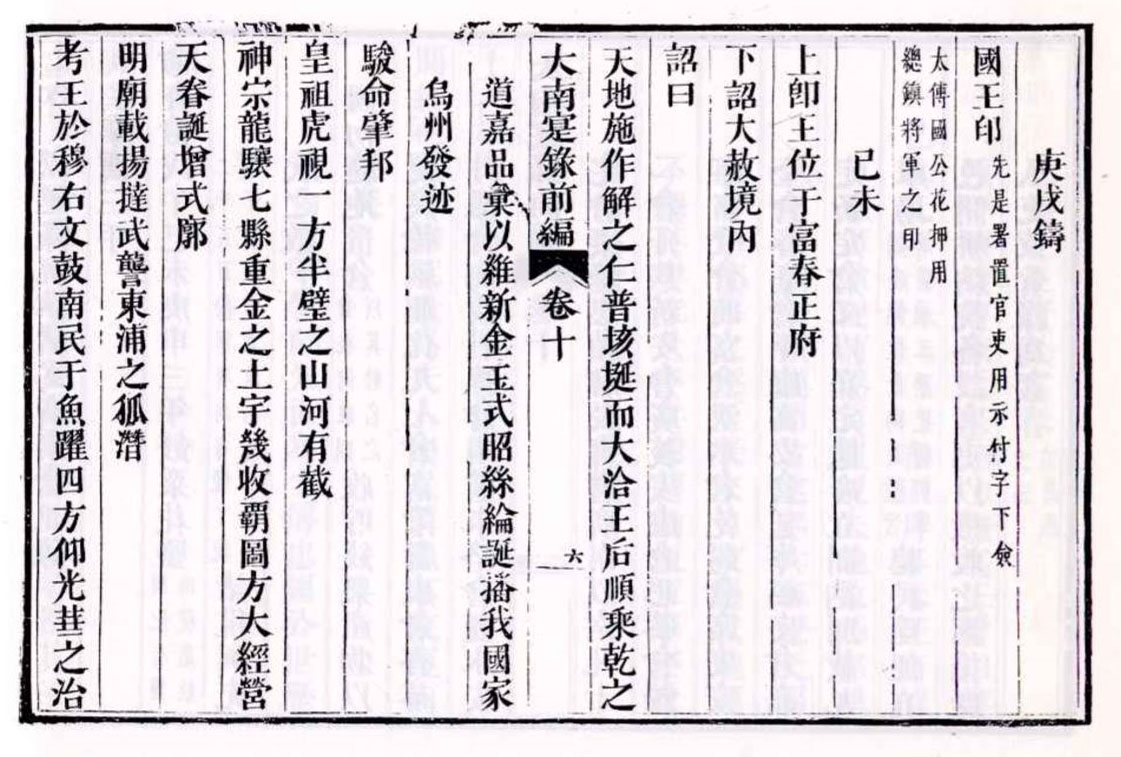
己未,上即王位于富春正府,下詔大赦境内。
On the Kỷ mùi day, His Highness ascended to the princely position at the main residence in Phù Xuân and issued an edict granting amnesty to all within the borders.
詔曰, The edict stated:
天地施作解之仁, Heaven and Earth extend the benevolence of their mercy,
普垓埏而大洽, Reaching the farthest extremes and spreading everywhere.
王后順乘乾之道, The sovereign follows the principle of ascending the ultimate,
嘉品彙以維新, Blessing all things and bringing about renewal.
金玉式昭, [As] gold and jade shrine with brightness,
絲綸誕播。 [May] this imperial decree be broadcast far and wide.
我國家, Our dominion,
烏州發迹, Rose to prominence in Ô châu,
駿命肇邦。 With a grand mandate, a realm was created.
皇祖虎視一方, The imperial progenitor glanced like a tiger on one region,
半壁之山河有截, The distinct half of a realm;
神宗龍驤七縣, The divine forefather pranced like a dragon on seven districts,
重金之土宇幾收。 A soon-to-be acquired territory of riches.
霸圖方大經營, The hegemonic plan enlarged their labors,
天眷誔增式廓。 Heaven’s assistance expanded the scale.
明廟載揚, Praise to the illustrious ancestor!
撻武讋東浦之狐潜。Whipping up martial [prowess], he struck fear in the hiding foxes in Đông Phố.
考王於穆, Hail to the paternal prince!
右文鼓南民于魚躍。He valued civil affairs and roused the leaping fish for the southern people.
四方仰光華之治, The glorious administration is admired by people from the four directions,
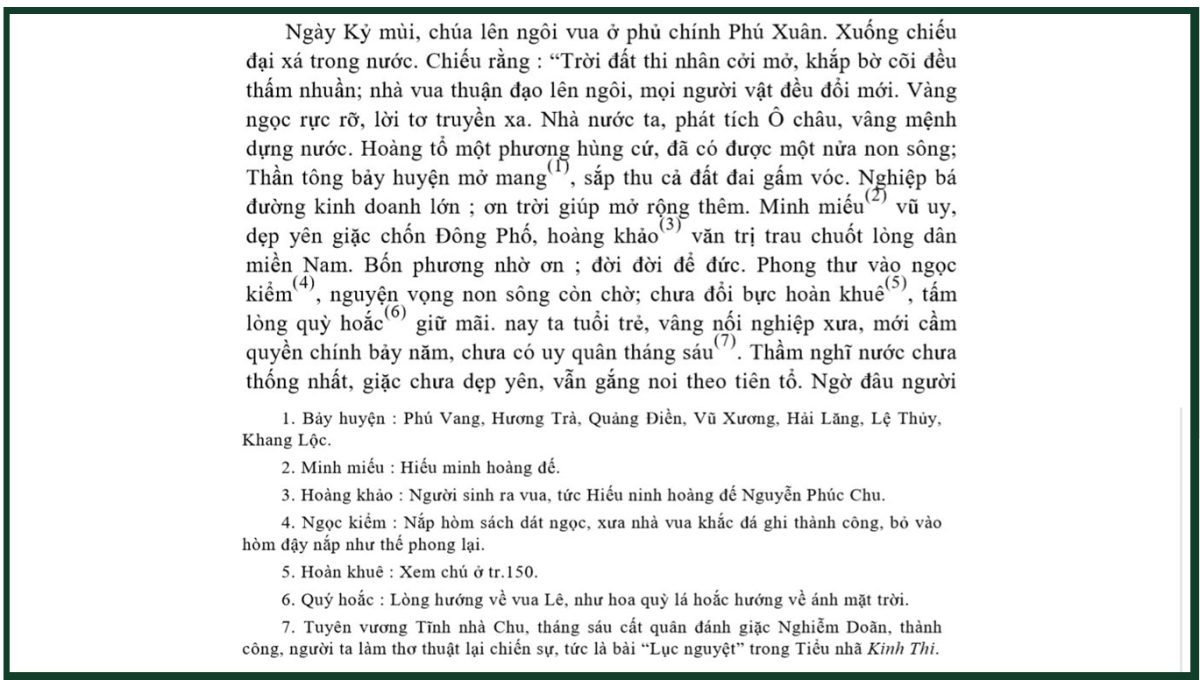
累世流豐芑之仁。 And the benevolence of education has been transmitted through the generations.
玉檢可封, The jade case should be sealed;
尚鬱山川之望, To keep amassing the hope of the mountains and rivers,
桓圭未改, The audience tablet has not changed;
長懸葵藿之心, To long maintain the intent of the sunflower and bean leaf.
肆予冲人紹兹令緒,Having inherited from my predecessors such a brilliant mighty enterprise,
方布七年之政, I have only declared my rule for seven years,
未宣六月之威, And have yet to announce the mightiness of the sixth month.
深思統未混, Considering carefully that unity has still not been achieved,
賊未平, And that bandits have still not been pacified,
奮發期繩祖武, I am making efforts to follow my ancestors’ footsteps.
詎意僉合謀, To my surprise, others have strategized together,
神合吉, And the spirits have created auspiciousness together;
慇懃屢請徽稱, Sincerely requesting numerous times [that I accept] the beautiful name,
日者大小具孚, Recently old and young all showed their trust,
濟蹌在列, Respectfully presenting themselves [before me].
龍或躍, The dragon is hesitating to leap,
而乾爻在四, The line of Càn/Qian is on the fourth,
猶用撝謙, It is still necessary to wave the banner of modesty.
馬利貞, The horse is advantageous and firm,
而坤義迪三, The meaning of Khôn/Kun has opened the third,
普同勸進, All encourage [me] to advance [to the throne].
度德屢辭于在四, Appraising my moral strength, I have declined repeatedly,
同心難遏于三千, Feeling sympathy, it is difficult to suppress [the desire of] the many.
匪出我懷, Although not coming from what I harbor inside,
姑從輿望, I will provisionally follow the people’s wish,
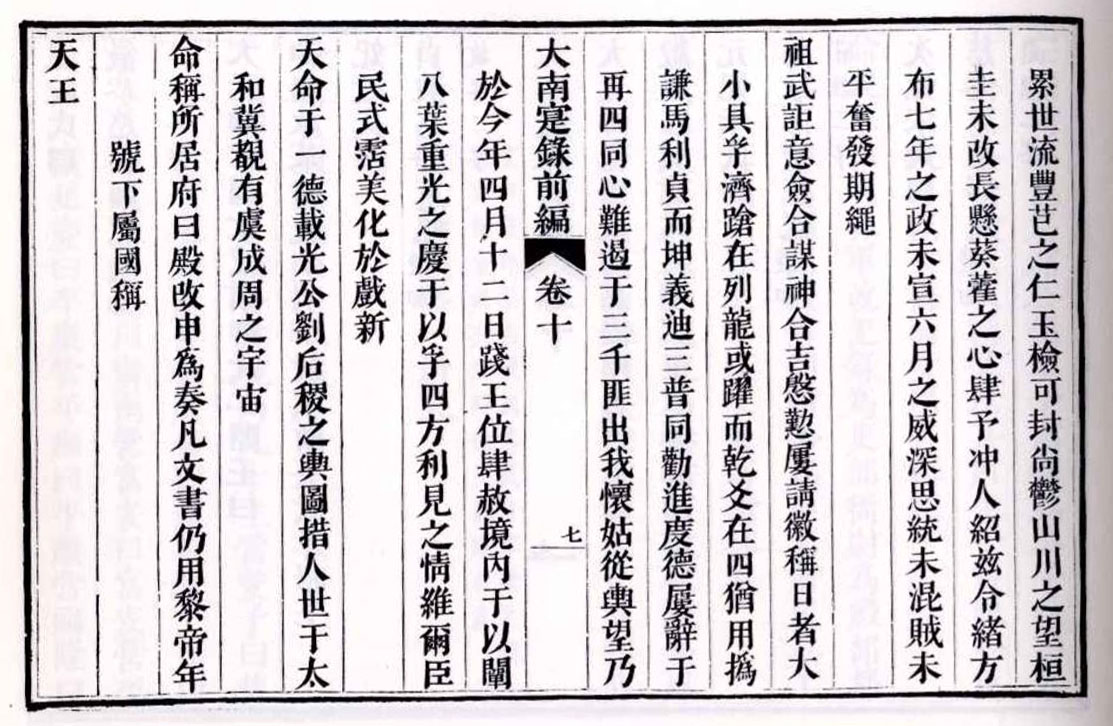
乃於今年四月十二日,And on this twelfth day of the fourth lunar month of the current year,
踐王位, Step upon the prince’s throne,
肆赦境内, And grant amnesty to all within the borders,
于以闡八葉重光之慶,In order to extol the glorious blessings of eight generations,
于以孚四方利見之情,And in order to be sincere to the sentiments of the four directions for an advantageous meeting
維爾臣民式霑美化,You officials and people will be blessed with a beautiful transformation.
於戲, Alas!
新天命于一德, Renewing the mandate of Heaven with uniform virtue,
載光公劉后稷之輿圖,Conveyed glory to the territory of Gong Liu and Hou Ji,
措人世于太和, Ordering human affairs with great harmony,
冀覩有虞成周之宇宙。Offered hope to see the domain of You Yu and Cheng Zhou.
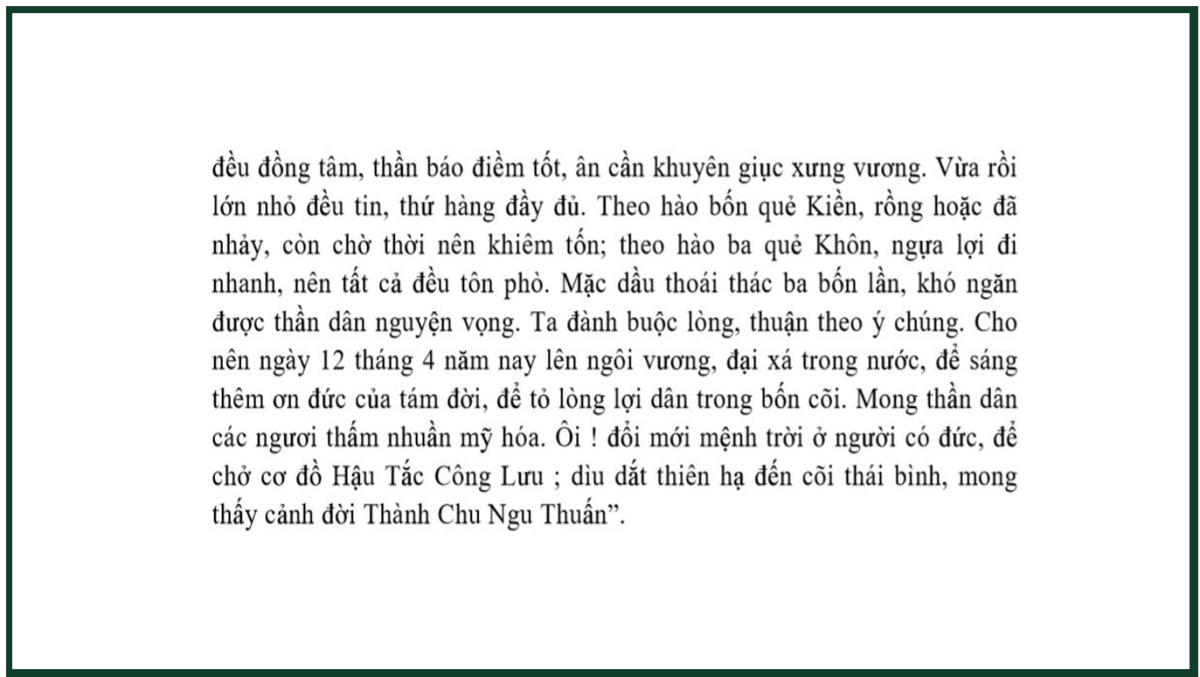
There are two passages in this document where Nguyễn Phúc Khoát responds directly to Nguyễn Đăng Thịnh’s request that he declare himself to be an emperor. At the end of his petition, Nguyễn Đăng Thịnh noted that Nguyễn Phúc Khoát controlled much more territory than the Shang Dynasty did in antiquity (and that he therefore had the potential to create an empire), and yet that he was still an “audience tablet” holder, that is, an official serving an emperor – the Lê Dynasty emperor in this case.
Nguyễn Phúc Khoát responded to that comment by stating the following:
玉檢可封, The jade case should be sealed;
尚鬱山川之望, To keep amassing the hope of the mountains and rivers,
桓圭未改, The audience tablet has not changed;
長懸葵藿之心, To long maintain the intent of the sunflower and bean leaf.
The term “jade case” (ngọc kiểm 玉檢) is a very specific term that was first mentioned in an annotation to a passage in the History of the Han (Hanshu 漢書) about Emperor Wu of the Han’s performance of the Feng and Shan 封禪 sacrifices at Mount Tai.
These sacrifices were practiced from the Zhou Dynasty period onward. In performing this ritual, the emperor erected a stone on which was carved his (military) accomplishments, and he made announcements to Heaven and Earth.
The texts that contained those announcements were sealed in different containers, one being a “jade case,” as these texts were considered to be the private communications between the emperor and Heaven.
The Feng and Shan sacrifices were a very important ritual for establishing and maintaining the relationship between the emperor and Heaven. However, by saying that “The jade case should be sealed; to keep amassing the hope of the mountains and rivers,” Nguyễn Phúc Khoát appears to have indicated that it was not time yet for him to have such a relationship with Heaven, and the following line explains why.
By saying that “The audience tablet has not changed; to long maintain the intent of the sunflower and bean leaf,” Nguyễn Phúc Khoát was indicating that he was still a Lê Dynasty official, that is, someone who still held an audience tablet when (theoretically) meeting with the emperor.
And further, just as sunflowers (qùy 葵) and bean leaves (hoắc 藿) always turned towards the sun, so did Nguyễn Phúc Khoát always look towards the Lê emperor as his sovereign.
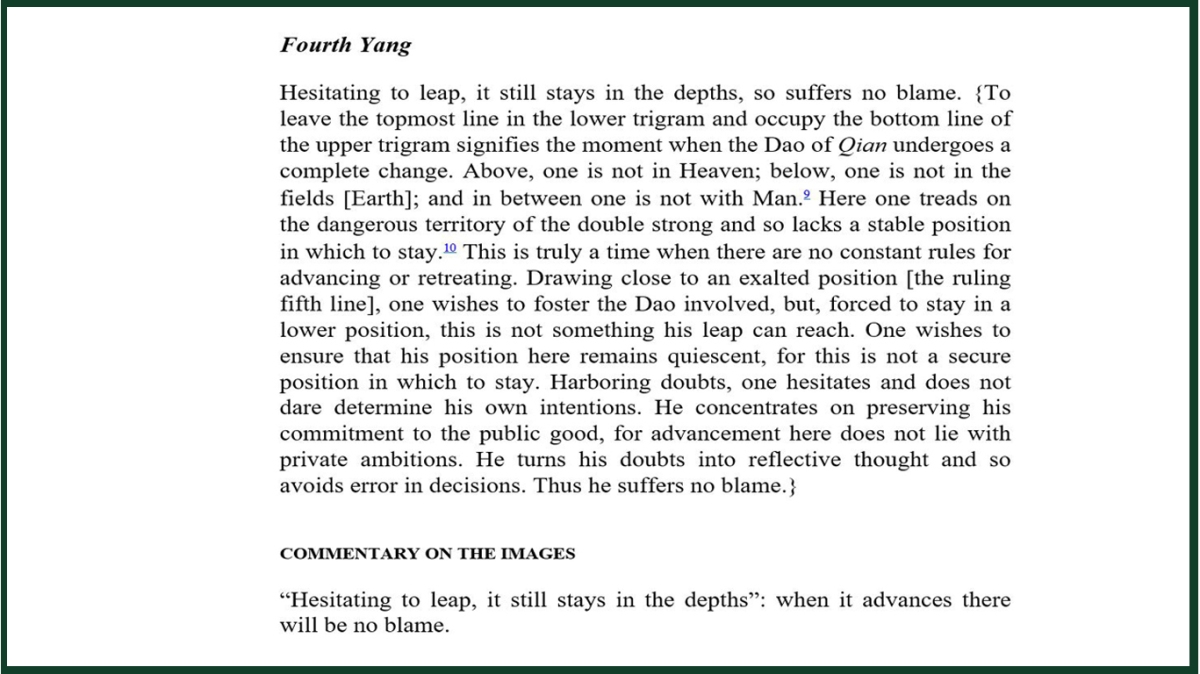
As we saw in the previous post, Nguyễn Đăng Thịnh also requested that “The ninth layer [don] the dark robes and cap and fly the banner of modesty.” This line is filled with symbolic expressions and we can translate it into common language by saying something like “the emperor (meaning Nguyễn Phúc Khoát) wear the imperial robes and act with the modesty” (with the assumption being that an upright ruler is supposed to rule with modesty).
Nguyễn Phúc Khoát responded to this line by making reference to the Classic of Changes (Yijing 易經), where the expression “fly the banner of modesty” (huy khiêm 撝謙) comes from.
龍或躍, The dragon is hesitating to leap,
而乾爻在四, The line of Càn/Qian is on the fourth,
猶用撝謙, It is still necessary to wave the banner of modesty.
The first hexagram in the Classic of Changes is Càn/Qian 乾. Like all hexagrams, it consists of six lines, and each line is explained in the text.
The fourth line is explained as follows: “Hesitating to leap, it still stays in the depths, so suffers no blame” (hoặc dược tại uyên, vô cữu 或躍在淵,無咎).
This is how Richard John Lynn translates this line in his The Classic of Changes: A New Translation of the I Ching as Interpreted by Wang Bi (Columbia, 2004) [See the images above and below]. I like that translation but the first part has been translated more literally by others as something like “as if leaping, it is still in the depths/deep.”
The “it” referred to here is a “dragon,” and that is clear from the other parts of the explanations for the lines of the Càn/Qian hexagram where the term “dragon” is used.
Dragons were symbolic of emperors, and this line has thus been traditionally understood to refer to so someone who perhaps has the potential to become an emperor, but because the time is not right, he therefore “hesitates to leap” and “stays in the depths” where he “suffers no blame” for trying to advance himself at the wrong time.
As someone who was “hesitating to leap” into becoming an emperor, Nguyễn Phúc Khoát stated that “it is still necessary to wave the banner of modesty,” and in doing so, he appears to have played with this expression. Whereas Nguyễn Đăng Thịnh used the expression “waving the banner of modesty” to refer to how an emperor acts, Nguyễn Phúc Khoát used it more literally to mean that he needed to continue to be humble, as it was not time yet for him to become emperor.
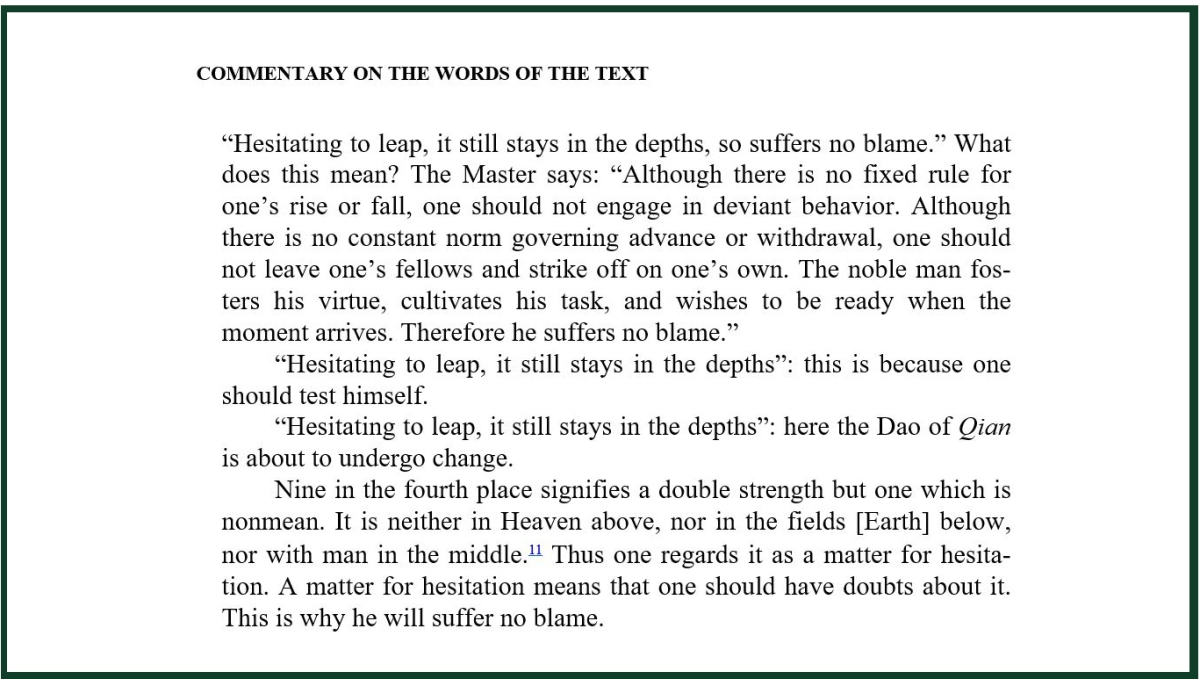
These are extremely important passages for understanding this event, however the language used in these passages are what I would call Level Three difficulty (see this earlier post on the different levels of linguistic difficulty in this text), as they require that one look up characters and then do further research to try to understand what Nguyễn Phúc Khoát meant.
And as I mentioned before, the Vietnamese translations of Hán writings at this level of difficulty tend to be unsatisfactory, and the translation here is no exception.
For instance, for “The jade case should be sealed, to keep amassing the hope of the mountains and rivers,” the Vietnamese translation has “A letter is put in a jade case, the hope of the mountains and rivers still waits” (Phong thư vào ngọc kiểm, nguyện vọng non sông còn chờ.).
There is then a footnote explaining that the “jade case” was a kind of case for books that was laminated with jade, and that the emperor would record his accomplishments on a stone and put it in this case. (Ngọc kiểm: Nắp hòm sách dát ngọc, xưa nhà vua khắc đá ghi thành công, bỏ vào hòm dậy nắp như thế phong lại.)
As far as I can tell, this footnote doesn’t help a reader understand what Nguyễn Phúc Khoát wrote.
Part of the problem is that the translators did not seem to understand what exactly this “jade case” was or how it was used.
In the Feng and Shan sacrifices, the emperor 1) had a stone engraved and erected, and he 2) had the statements that he made to Heaven and Earth sealed in cases.
If you look up the term “jade case” (ngọc kiểm 玉檢) in a Chinese-Chinese dictionary, it will provide the passage where the term first appeared. That passage that appears in dictionary definitions, however, is too short to understand without seeing the larger textual context where it comes from, and without doing some research on the Feng and Shan sacrifices.
For those who can read Hán, the image below contains what one finds in dictionary definitions as well as the larger textual passage where that line appears. From that larger textual passage, one can see that carving one’s accomplishments in a stone and erecting it was a separate matter. (And for more on this topic, see Jing Wang’s The Story of Stone [Duke, 1991].)
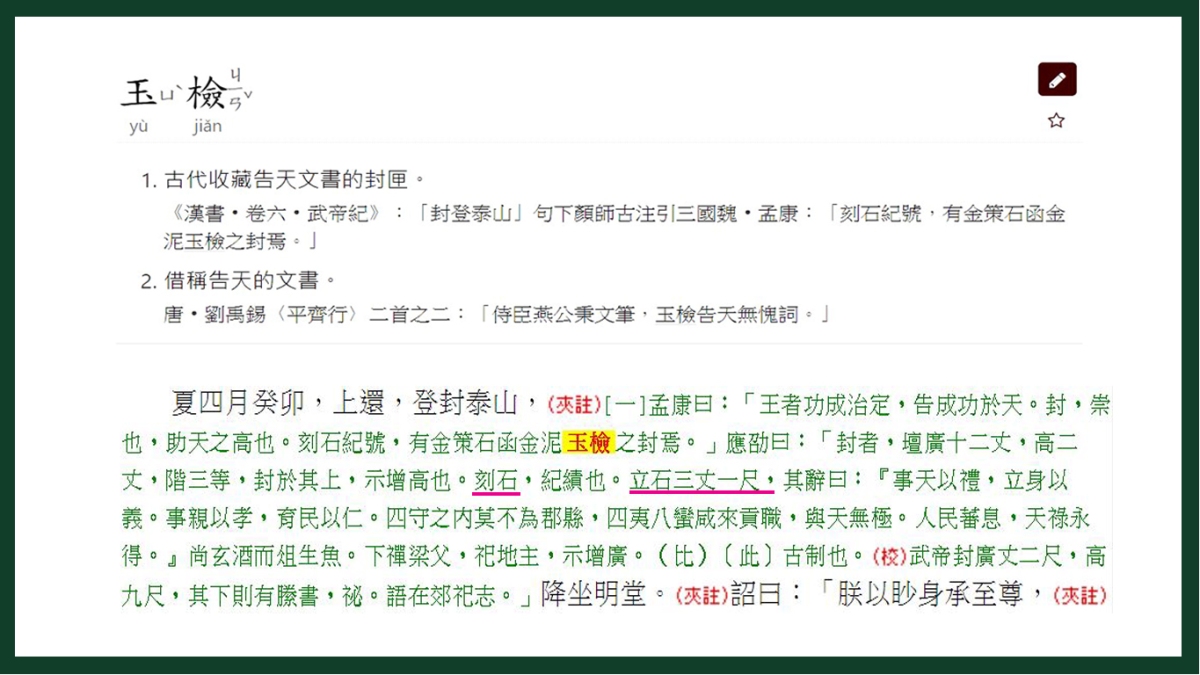
As for the passage from the Classic of Changes, the Vietnamese translation likewise does not help a reader to fully understand what this means. The translation says that “Following the fourth line of the hexagram for Càn/Qian [= Kiền], the dragon may have leapt, and still waiting for the right time, must be modest.” (Theo hào bốn quẻ Kiền, rồng hoặc đã nhảy, còn chờ thời nên khiêm tốn.)
Ok, so one can get a general idea of what this passage is about from this translation (that Nguyễn Phúc Khoát was saying something about the time not being right yet), but saying “the dragon may have leapt” (rồng hoặc đã nhảy) makes it impossible to understand what the actual idea in the Classic of Changes is and why Nguyễn Phúc Khoát made reference to it.
There is no “maybe” in this passage in the Classic of Changes, and nothing has happened yet. Yes, the dragon “appears as if leaping,” but it has not leapt, and it is not going to leap. That’s the whole point.
There is much more about this document that we can talk about, but we’ll save that for future posts. For now, the one thing that should be clear is that while in 1744 Nguyễn Đăng Thịnh and others encouraged Nguyễn Phúc Khoát to declare himself emperor, Nguyễn Phúc Khoát refused to do so.


This Post Has One Comment
Modesty, caution, and prudence are all marks of great wisdom and benevolence. Such ideals seem lost in the 20th century and the modern world.